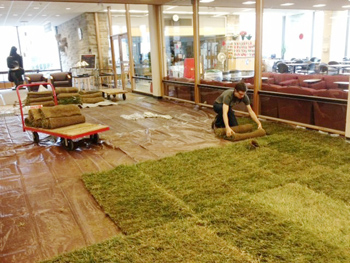Cornell Brings Nature to its Halls
 ITHACA, N.Y. — The grass is always greener on the other side, at least that is what students at Cornell University in Ithaca, N.Y. may say. When it comes to stress, students facing a tough week of finals can tell you all about it. University officials at Cornell University in Ithaca, N.Y., wanted to help alleviate some of that stress and did so with the help of the university’s Department of Design and Environmental Analysis.
ITHACA, N.Y. — The grass is always greener on the other side, at least that is what students at Cornell University in Ithaca, N.Y. may say. When it comes to stress, students facing a tough week of finals can tell you all about it. University officials at Cornell University in Ithaca, N.Y., wanted to help alleviate some of that stress and did so with the help of the university’s Department of Design and Environmental Analysis.
The university brought grass lawns indoors so students could have a relaxed environment to study and crunch for final exams. The grass is located in the lobbies of two libraries as well as two science buildings on campus, according to the university.
“Being in touch with nature helps people be calmer, and they feel refreshed and productive,” said Eveline Ferretti, Cornell library’s public programs and communications administrator, in a statement.
This is not the first time Cornell has brought the outdoors inside the halls of the university. In the fall they installed the university’s first indoor lawn in the Mann Library.
“The library is the perfect place for it,” Ferretti said in statement. “It’s great to see people willing to lay down in the grass and just relax there. The main goal is really to make people happy.”
As many may remember, Cornell University experienced several suicides in 2010, when students jumped off bridges located around the school groups. Throughout history the university has had 27 people commit suicide between 1990 and 2010. Many were rumored to be from stressful academic situations, but cannot be completely confirmed.
The grass acts as a calming and yet exciting addition to the halls of the university, and by placing it near the library might even attract more students to study.
“Sod furniture is thrilling, since, unlike other horticultural art, which may require a long period of time to come to life, it offers instant gratification,” said Marcia Eames-Sheavly, a senior extension associate at Cornell and director of the Garden-Based Learning program. “Students have responded to the joy of working hard and collaboratively, should to shoulder, to plan and implement them, and then, to enjoy the seating and witness others doing the same.”
Eames-Sheavly also explained, “We know from research that time spent in nature fosters diverse facets of our well-being, from cognitive function to lower stress levels. They are easy to create and do not require elaborate materials.”
